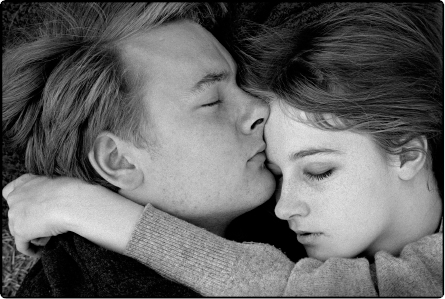Different Types of Romantic Love
Though most people recognize that loving differs from liking, many also believe that to be in love, one must feel constant and consuming sexual attraction toward a partner. In fact, many different types of romantic love exist, covering a broad range of emotions and relationship forms. At one end of the spectrum is passionate love, a state of intense emotional and physical longing for union with another (Hendrick & Hendrick, 1992). For example, think of how the media depict couples who are passionately in love: Jacob and Anna in the film Like Crazy, Olivia Pope and Fitzgerald Grant on TV’s Scandal, or even real-life couples like Beyoncé and Jay-Z. Their constant need for close contact (whether physical or communicative), expression of relationship happiness through social media posts or during conversations, and overall sense of delight permeates their entire lives.
If you’ve been passionately in love before, these feelings likely are familiar. Studies of passionate love support the universality of these sentiments and suggest that five things are true about the experience and expression of passion. First, people in the throes of passionate love often view their loved ones and relationships in an excessively idealistic light; talking about how “perfect” they are for each other and how their relationship is the “best ever.”

People who are passionately in love experience an intense longing to be physically near one another. What other traits or experiences do you associate with passionate love?
Philip Jones Griffiths/Magnum Photos
Second, people from all cultures feel passionate love. Studies comparing members of individualistic versus collectivistic cultures have found no differences in the amount of passionate love experienced (Hatfield & Rapson, 1987). Although certain ethnicities, especially Latinos, often are stereotyped as more “passionate,” studies comparing Latino and non-Latino experiences of romantic love suggest no differences in intensity (Cerpas, 2002).
Third, no gender or age differences exist in people’s experience of passionate love. Men and women report experiencing this type of love with equal frequency and intensity, and studies that exclude reference to sexual feelings have found that children as young as age 4 report passionate love toward others (Hatfield & Rapson, 1987).
Fourth, for adults, passionate love is integrally linked with sexuality and sexual desire (Berscheid & Regan, 2005). In one study, undergraduates were asked whether they thought there was a difference between “being in love” and “loving” another person (Ridge & Berscheid, 1989). Eighty-seven percent of respondents said that there was a difference and that sexual attraction was the critical distinguishing feature of being in love.
Finally, passionate love is negatively related to relationship duration. Like it or not, the longer you’re with a romantic partner, the less intense your passionate love will feel (Berscheid, 2002).
Although the “fire” of passionate love dominates media depictions of romance, not all people view being in love this way. At the other end of the romantic spectrum is companionate love: an intense form of liking defined by emotional investment and deeply intertwined lives (Berscheid & Walster, 1978). Many long-term romantic relationships evolve into companionate love. As Clyde and Susan Hendrick (1992) explain, “Sexual attraction, intense communication, and emotional turbulence early in a relationship give way to quiet intimacy, predictability, and shared attitudes, values, and life experiences later in the relationship” (p. 48).
Between the poles of passionate and companionate love lies a range of other types of romantic love. Sociologist John Alan Lee (1973) suggested six different forms that range from friendly to obsessive and gave them each a traditional Greek name: storge, agape, mania, pragma, ludus, and eros (see Table 10.1 for an explanation of each). As Lee noted, there is no “right” type of romantic love—different forms appeal to different people.
Table 10.1 Romantic Love Types
| Type | Description | Attributes of Love |
| Storge | Friendly lovers | Stable, predictable, and rooted in friendship |
| Agape | Forgiving lovers | Patient, selfless, giving, and unconditional |
| Mania | Obsessive lovers | Intense, tumultuous, extreme, and all consuming |
| Pragma | Practical lovers | Logical, rational, and founded in common sense |
| Ludus | Game-playing lovers | Uncommitted, fun, and played like a game |
| Eros | Romantic lovers | Sentimental, romantic, idealistic, and committed |
Self-Reflection
Is passion the critical defining feature of being in love? Or can you fall in love without ever feeling passion? Given that passion typically fades, is romantic love always doomed to fail, or can you still be in love after passion leaves?
Question
Self-Reflection